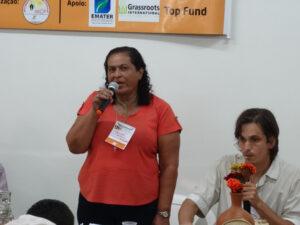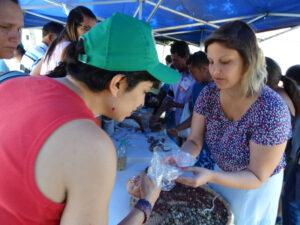Learning Without Borders, With Struggle and Hope: Our Time with MCP
For organizations whose work is under constant threat and whose success depends on constantly improving and adapting, learning exchanges are a vital organizing strategy. That’s why one of the ways that Grassroots International supports change-makers is by connecting them with each other through learning exchanges, where partners are able to learn about movement-building, agroecological farming techniques and build understanding and unity around common struggles.
In September 2016 eleven of our partners, grantees and allies flew to Goiás, Brazil to participate in a learning exchange of peasant movements that Grassroots International organized along with our friends at IDEX/Thousand Currents. The exchange included members of We Are the Solution (West Africa region), La Via Campesina Honduras, the Surplus People’s Project (South Africa), Ñepi Behña (Mexico) and AFEDES (Guatemala). The purpose of this learning exchange was to connect these different groups with movements in Brazil, to learn from one another and to share experiences. Our group was made up of almost all women, representing ten nationalities and speaking four different languages (French, Spanish, Portuguese and English). The group became close very fast and was able to build strong relationships and learn from each other, even with all the language differences.
The learning exchange started in Goiás where we were hosted by the Popular Peasant Movement (MCP) and had the opportunity to participate in their Creole Seeds and Biodiversity Seminar followed by site visits to meet with MCP members and see their work.
We arrived on the day that the Brazilian senate voted to impeach President Dilma, Brazil’s first female president, and installed Michele Temer as president under an institutional coup. Temer, who first took power in May (when Dilma was suspended), appointed an all-male, all-white cabinet as soon as he came to power, and quickly moved to eliminated the ministries of Agrarian Development, Communications, Human Rights, Racial Equality and Women, and the Secretary of Control of Ports and Airports. This was the context that our Brazil partners were coming to grips with when they received us.
The Creole Seeds and Biodiversity seminar is MCP’s annual national gathering where they come together to meet, learn and exchange seeds. The seminar was three days long and full of panels, presentation and workshops.
Anita Sutha, Coordinator of We Are the Solution-Ghana, spoke on a panel about women farmers associations in her country and about their challenges and successes in organizing – including how they organized a community lending group for women farmers. “Each month women put money in a box, and then when a woman needs a loan she can get it. She can use it to buy school clothes for her children or whatever she might need, and she doesn’t have to go through a man to get the money.”

Esperanza Cardona, of the Women’s Commission of La Via Campesina-Honduras, spoke on another panel about the current situation in Honduras – the violence, displacement and repression that peasant and indigenous peoples are facing and the ways they are resisting. Describing the corruption, Esperanza said that narco-trafficking one of the problems “which is woven into the criminal political power structure. An example of this was the five high-ranking police officers along with the son of the ex-president of Honduras who were extradited to the US on trafficking charges.”
Esperanza also spoke about Berta Caceres’ assassination and what a huge loss that was for the movement. She left us with a message of inspiration, though, both regarding Berta’s death and the many who are taking action now – saying “Berta didn’t die, she multiplied!” – and calling us to join her in chanting the La Via Campesina International rallying cry – “Globalize the struggle, globalize hope!”
Throughout the seminar the coup was a major focus. People were figuring out what the next steps were in building resistance to growing repression. The chant “For a Temer!” (“Temer out!”) was a common refrain.

The last day of the seminar there was an exchange of creole seeds (also known as native or heirloom seeds). MCP members from all over Brazil came to trade seeds and share knowledge. We got to check out the many different varieties of beans and vegetables that are grown in different parts of Brazil, and the learning exchange members got seeds to take home and received tips on how to plant, care for and consume them.
After the seminar we spent two days with MCP’s Sandra Alves and Mariene Pereira (of MCP’s National Coordination team), visiting MCP families and learning about their work and how they organize. One of the first places we went to was a farmers market organized by MCP. This market is a place for peasant families – MCP members and others – to sell their produce and the products they make with what they grow (herbs and spices, cheeses, candies, snacks, etc.).
In the following days we got to visit MCP’s creole seed reproduction fields and learned about their process of selecting the healthiest, most resilient seeds, and what they do to make sure that their seeds don’t get cross-contaminated with GMOs. Members of the learning exchange shared their experience and techniques using agroecology to grow healthy food. The semi-arid climate of where we were in Goiás was similar to the climate in Ghana, so learning about each other’s methods was very valuable.
On our last day with MCP we traveled to Brasília (the capital of Brazil), where rural movements were converging to protest the coup government and to demand continued support for peasant farmers and for agrarian reform. The protesters had occupied a government building and were able to setup talks with government officials, although not much came out of them in the end.
We saw what they were fighting for – the right to grow healthy food, the right to feed their communities, the rights of consumers to be able to buy healthy, nutritious food and support sustainable agriculture. MCP fought a long time to get government programs to support their work – to help them distribute seeds, to sell food to public schools, to provide technical support in producing creole seeds – and now they are demanding that the government continue to support the people who grow the country’s food. Their unity and commitment to fighting for these basic rights was inspiring to all of us.
To build a global movement for justice led by those on the frontlines, it is essential that movements be linked from the local to the international. Building these relationships supports the exchange of ideas – from how to grow crops using agroecology to how to mobilize farmers to defend their rights. It also builds understanding about of common enemies – the same companies that are promoting the use of GMO seeds and chemical fertilizers and pesticides in Brazil are doing the same in Africa. To oppose multinational corporations we need multinational resistance.
As Esperanza said, “Globalize the struggle, globalize hope!”


